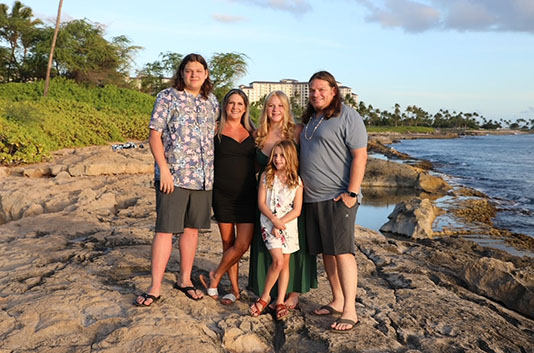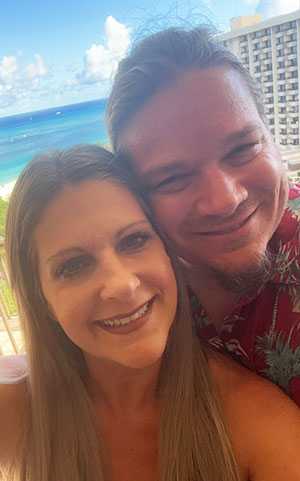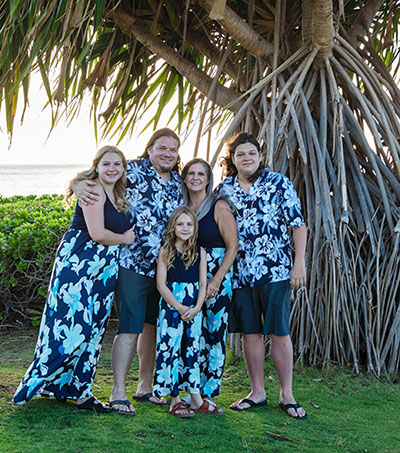Reducing Veteran Suicide: Army Veteran Finds Light in the Darkness, Aims to Give Others Hope

The pristine beaches beckoned visitors with their colorful arrays of powdery sand. The clear, turquoise waters washed away worries with waves of tranquility and splendor. The alluring mystery of the island begged to be explored and appreciated. For the Pierstorff family, the magical oasis was a place to reconnect and reinvigorate, a symbol of all the beauty and magnificence life has to offer.
But it wasn’t always like this.
Veteran Joey Pierstorff remembers the struggles he had during – and after – his time in the military. He had joined the Army at just 18 years old, motivated to serve after the 9/11 attacks. He spent 11 years in the service, deploying multiple times to Iraq, where the constant barrage of explosive devices became commonplace. Joey recalls the aftermath when the Humvee he was driving hit an IED, causing him to lose his equilibrium, unable to see, hear, or walk.
Even after returning from war, Joey faced different challenges at home. He was still juggling his responsibilities as an active-duty soldier along with the demands of being a husband and a father, all while continuing to combat the symptoms of post-traumatic stress disorder (PTSD) and traumatic brain injury (TBI).
Sometimes it was hard to see the light through all the darkness. In those times, Joey thought about giving up. At one point, the night before leaving on another deployment to Iraq, Joey decided to see how many pills he could swallow and how many drinks he could down. He thought if he woke up after that, he’d go ahead and return to the warzone. And if he didn’t wake up, “so be it.”
Joey survived that attempt, and despite his struggles with his mental health and still coping with PTSD, he returned to Iraq and remained in the Army. In 2013, as his PTSD symptoms progressed, Joey medically retired after more than a decade of service. He thought life would automatically improve without the constant stress of going to war.
It didn’t.
A lack of structure, absence of military friends who understood what he was going through, the need to provide for his family, and his untreated PTSD and TBI had him feeling lost and despondent.
“My entire adult life was spent in the military, and now post-traumatic stress disorder was overwhelming me,” Joey said.
He wasn’t in a good place when he first found Wounded Warrior Project® (WWP).
Feeling Lost
Joey wasn’t sure how to adjust to his new civilian life. Reaching out for help was something he came to realize he needed to do. He just wasn’t sure how.
“[In the military], we're training as a team all the time, we're always with each other, and we always have somebody to our left and our right,” Joey said. “Then you leave the military, and the burden of recovery is put on the individual. There is nobody to your left and your right who is going to make the decisions for you.”
After leaving the service, many veterans, like Joey, struggle to figure out the next phase of their lives. Then there are the extra burdens many veterans face, such as trying to earn a steady income, filing for VA benefits, or not being able to work because of injuries or illnesses sustained in service. Those things may not be directly related to mental health but can take a heavy toll on a service member’s mental well-being.
“There are always things that start to become overwhelming, overbearing, and you almost feel like that's the life you're going to get stuck in,” Joey said. “I think finding that personal motivation through accountability is what helped me say, ‘I can be more than this, and I'm going to be.’”
There’s also the stigma surrounding mental health, and the difficulty in knowing how to go about getting care. According to WWP’s Annual Warrior Survey, approximately 20% of warrior respondents said they have experienced difficulty or delays in getting or continuing mental health care. Of those, 78% said they wanted to solve the problem on their own, 66% said they would feel “embarrassed or ashamed” to seek care, and 59% said they are unsure of where to get professional care.
“When you leave the military, the people that used to talk to you about things were usually like-minded people,” Joey said. “I think that's where the disconnect is, and there's not a lot of specialized treatment out there for people who have post-traumatic stress disorder.
See more of Joey's story
Finding a Lifeline
Through WWP, Joey was able to connect with other veterans, and share his experiences. One of the Wounded Warrior Project programs that deeply impacted Joey was WWP Talk. Joey said just having someone to talk to, who didn’t judge and who could help give him focus, was a turning point in his life.
“I think the most eye-opening moment I had on all of my therapies was the WWP Talk program,” Joey said. “When I finished that, I realized that it showed me that there's a purpose and there's more beyond just trying to survive.”

WWP Talk is a free nonclinical, telephonic program that offers emotional support to warriors and family members and helps provide guidance and set attainable goals.
“Sometimes they just really need someone to talk to, someone to listen to them and not judge them for the things that are going on in their lives,” said Seneca Gulley, a Navy veteran and WWP Talk specialist who Joey credits with helping give him hope and find direction. “Warriors can openly talk about those things that have become one of the war wounds of them defending the country.”
According to WWP’s Annual Warrior Survey, 62% of warriors surveyed reported feeling lonely. The survey also showed that WWP warriors had lower levels of emotional support compared to the U.S. general population, especially on getting advice when dealing with a problem.
“It's really about meeting them where they are and trying to find out which emotions are the most out of control for them and what they’d like to get a better grip on,” Seneca said. “Setting smaller goals to lead up to that major goal within the timeframe they chose, and just work on the things that they want to work on and talk through the things they need to talk through. The goal is to be there to help them on the first steps of their mental health journey.”
WWP Talk can also connect veterans to other free mental health programs and services to help the warrior, including Warrior Care Network, Project Odyssey, and Peer Support. Reaching out for help when needed is an important – and courageous – first step.
“[It’s important] to reverse the stigma that you're weak if you can't mentally handle something,” Seneca said. “Putting effort into understanding just what mental health support is and getting that support is not saying that you're weak. It's actually saying that you're strong enough to be able to say, ‘I know my limitations and I need somebody else to help recharge me.’”
Making a Better Tomorrow
Joey still remembers the days when he didn’t want to wake up. He struggled with making the choice to keep fighting. His goal now is to help other veterans get through those dark times and help them see it can – and does – get better.
After getting help to treat the symptoms of his PTSD, Joey realized he could push forward. He started thinking about what life could be rather than what it had been. He re-enrolled in college, earning a bachelor’s degree and a master’s degree. He got a good job that enabled him to better care for his family. In July of this year, Joey was able to take his entire family on a well-deserved tropical getaway.

“When I left the military, we were nearly homeless; we didn't have anything,” Joey said. “And now we're to the point where I'm taking my whole family to Hawaii. We're able to enjoy the fruits of our labor. The hard work that we put in – because it wasn't just me – but as a family, we've gone through so much and we've persevered. We did everything we could, as a family, to make sure that we would make it to this point.”
Because he’s been there, Joey also recognizes life isn’t all butterflies and rainbows. He just feels getting the mental health help he needed better equipped him to face those challenges that are bound to come up.
“I've embraced that challenge, the challenge of trying to be better every day,” Joey said. “Even if it's just 1% better and knowing that even if I take a step back, that's fine. There are going to be bad days, but now I know I can choose to have good days. I can choose better for myself, and not look at the situations and events that happened in my life as a negative thing but look at them as a way to build and grow. I think that's where I changed. That's where my mind opened up and the light turned on.”
Veterans are at particular risk for suicide and suicidal thoughts. According to the Department of Veterans Affairs (VA), veteran suicide is 1.5 higher than non-veteran suicide. The WWP Annual Warrior Survey shows that nearly 1 in 4 warriors have had suicidal thoughts in the past 12 months and 48% reported at least one instance of suicidal ideation in their lifetimes.
Joey wants to make sure his fellow veterans know there is help available, and that they deserve that help.
“As much as you feel like you're alone, you're not alone,” Joey said. “You're not the first person who’s been there, and you won't be the last. But the only way to get through it, and the only way to ensure that you don't become a statistic, is to make sure that you talk to somebody. Pick up the phone. Send a text message.
“There are so many people out there who will talk to you, 24 hours a day, seven days a week, no matter what. That's what they want to do, and they're there for you. So don't ever think you're alone.”
Every day, approximately 17 veterans take their own lives. Joey knows he could have been one of those numbers. He wants other veterans to know no matter how it feels right now, if they reach out and take that chance, it can get better.
“It's a great feeling to look at where I was to where I am now,” Joey said. “By telling my story or by opening up about it, if I can help one person do the same thing, I think that's where all the work, all the effort, everything is worth it.”
Learn more about how WWP helps warriors and their families through mental health programs at www.woundedwarriorproject.org/CombatStigma.
If you or someone you know is struggling with thoughts of suicide, contact the Veterans Crisis Line by dialing 988 (press 1), or texting 838255
Contact: — Paris Moulden, Public Relations, pmoulden@woundedwarriorproject.org, 904.570.7910
About Wounded Warrior Project
Since 2003, Wounded Warrior Project® (WWP) has been meeting the growing needs of warriors, their families, and caregivers — helping them achieve their highest ambition. Learn more.